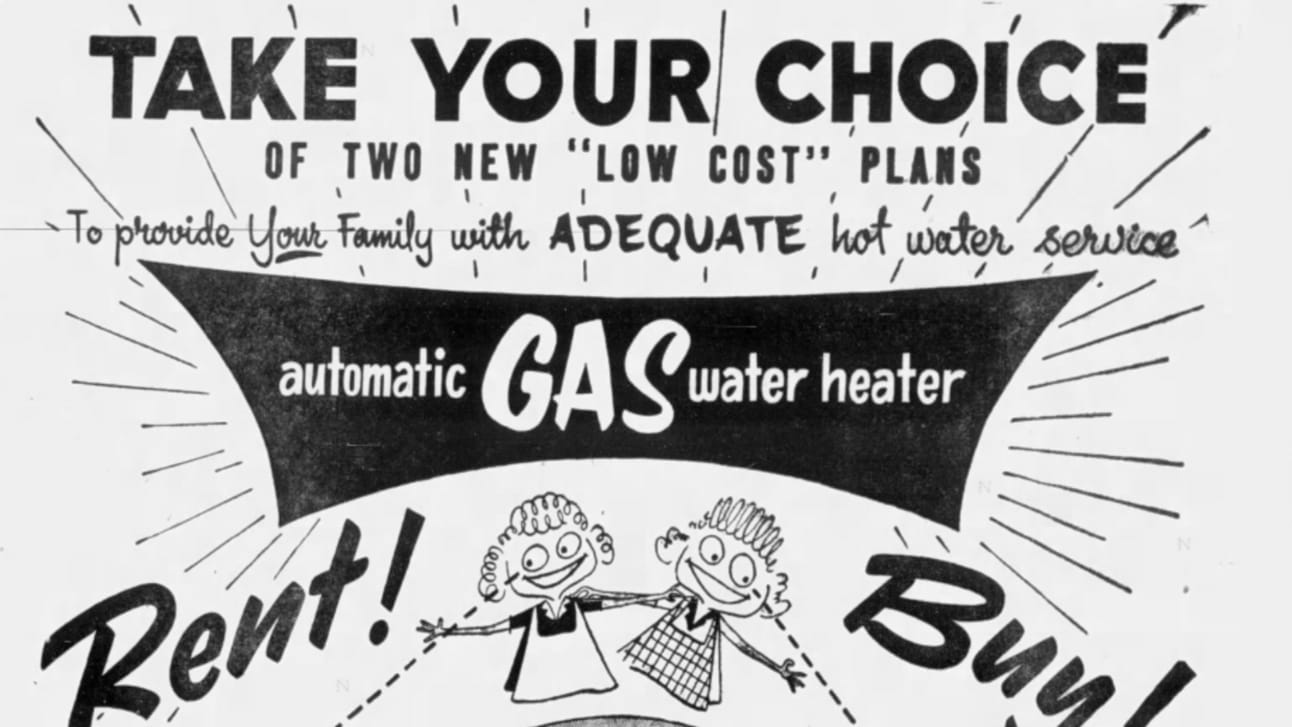Why renting HVAC equipment in the U.S. isn’t as popular as in Canada — yet
Rentals gained significant traction in Canada as a compliment to gas services

Image: The News of Cumberland County, 1956, via Jeff Huntington
Editor’s note: This article was contributed by Jeff Huntington, an HVAC contractor in Canada, and lightly edited for clarity.
Alec Stevanovski of Homepros recently asked me, “Why is renting or leasing HVAC equipment more common in Canada than in the U.S.?” Given the fact that renting provides industry-leading margins, it’s a question worth pondering.
Having worked in the Canadian HVAC rental industry for over a decade, I’ve managed and deployed thousands of rental agreements and now consult companies on implementing rental programs.
The big picture: Renting water heaters and HVAC equipment isn’t an entirely new concept. For instance, in my hometown of Regina, Saskatchewan, water heaters have been rented since at least the 1970s. Today, approximately 80% of residents in Regina rent their water heaters. The primary reason? Tradition. It’s simply what most people have always done.
However, while the water heater concept is well-established in markets like mine, many customers remain unaware of it. Most customers only learn about rental options during the quoting process.
Zoom out: Water heater rentals gained significant traction in Canada as a complement to gas services. Adding a small monthly charge to an existing utility bill made the rental option an easy decision for customers.
In Ontario, the model’s popularity was so strong that regulators forced gas utilities to spin off their water heater rental divisions, creating some of today’s most prominent home service companies, including Reliance Home Comfort and Enercare (which owns Service Experts).
Why it matters: For HVAC companies, introducing a rental option can be an effective way to diversify revenue.
Once the option is presented during the quoting process, it’s common to see about 15-20% of customers choose rentals over ownership, particularly when they understand the benefits. And companies with a strong rental culture can see conversions as high as 50%.
Those benefits? No installation costs. Customers who prefer not to make large, upfront payments are drawn to the financial flexibility of renting.
-
Convenience. Even for the financially secure, budgeting becomes easier with consistent monthly payments.
-
No maintenance or repair concerns. Service providers take care of repairs, maintenance, and replacements — for no added cost.
-
Property management. Landlords often prefer rental arrangements for their simplicity and the reduced maintenance burden.
Yes, but: Incorporating a rental model isn’t without challenges:
-
Pricing. Determining the appropriate rental rate can be difficult, as traditional pricing models don’t always apply. Profitability forecasting may also be uncertain without established data.
-
Legal considerations. In many regions, businesses need to comply with loan regulations and register the equipment’s ownership on the property title, which can be a hurdle.
-
Capital requirements. Renting requires a significant initial investment, with a typical return on investment spanning 30-40 months.
Despite the complexities, those who successfully navigate the challenges of rental programs often achieve significant success. A well-structured rental portfolio offers consistent, recurring revenue and healthy margins.
Customers enjoy the peace of mind of knowing their equipment is professionally maintained, while technicians benefit from steady work without the hassle of financial transactions on each job.
But, to be honest, I still wonder why the model hasn’t gained the same traction in the U.S. While the benefits for both customers and business owners are clear, and I’ve seen the success of rentals in Canada firsthand, I don’t have a definitive answer.
It could be cultural preferences, a stronger focus on ownership, or simply a lack of awareness and utility involvement. It’s possible that well-established financing models in the U.S. have also overshadowed the rental concept.
Whatever the reason, it remains an open question. What I do know is that, for HVAC businesses willing to explore rental options, the potential rewards are significant. Maybe it’s just a matter of time before the U.S. sees the same shift that’s already begun in Canada.
📬 Get our stories in your inbox
Keep reading
HVAC Deals: August 2024
Recent investment activity from around the industry
HVAC startups get hot, drawing new investments
September 25, 2023


